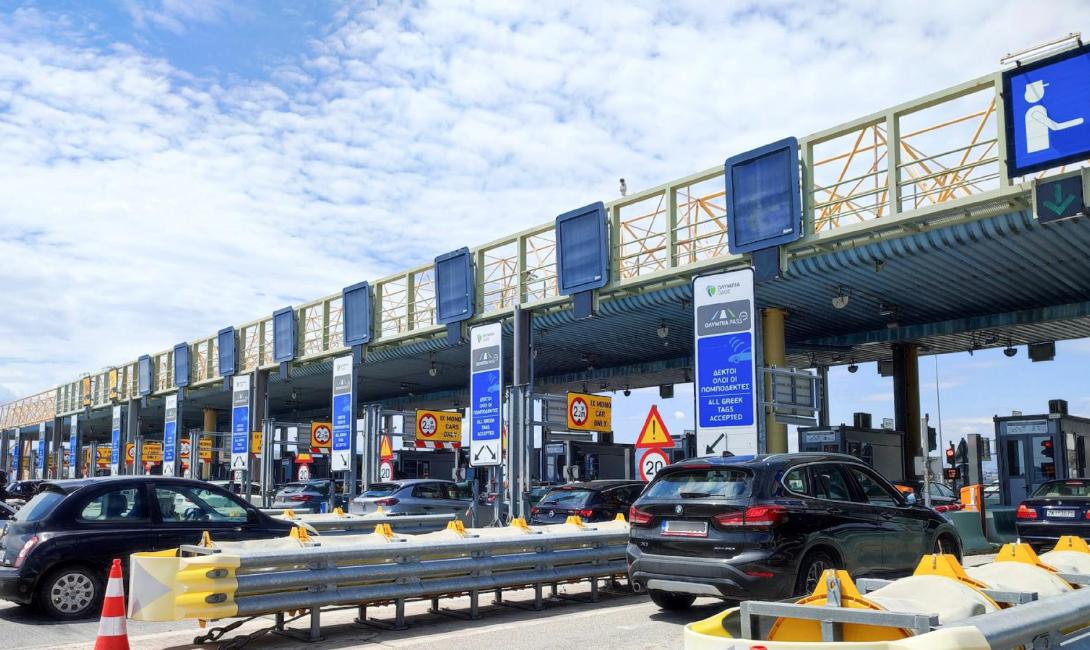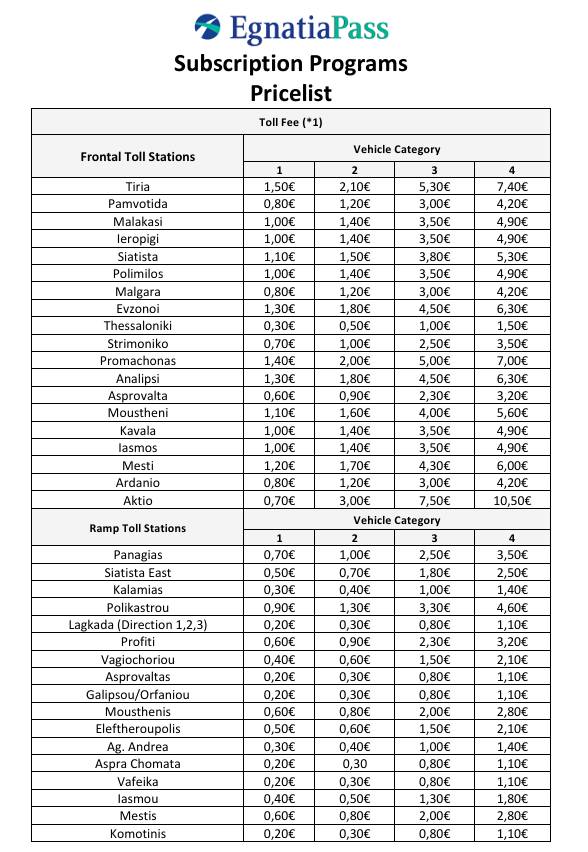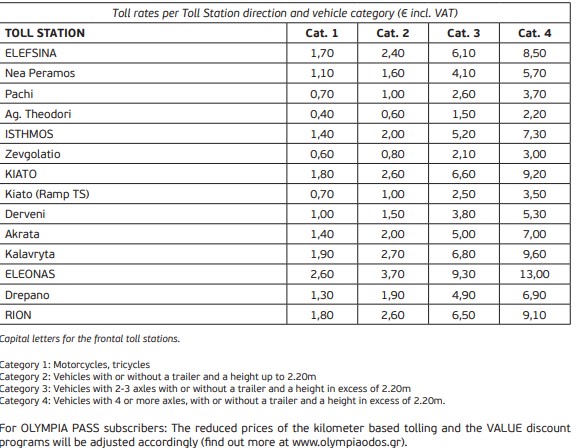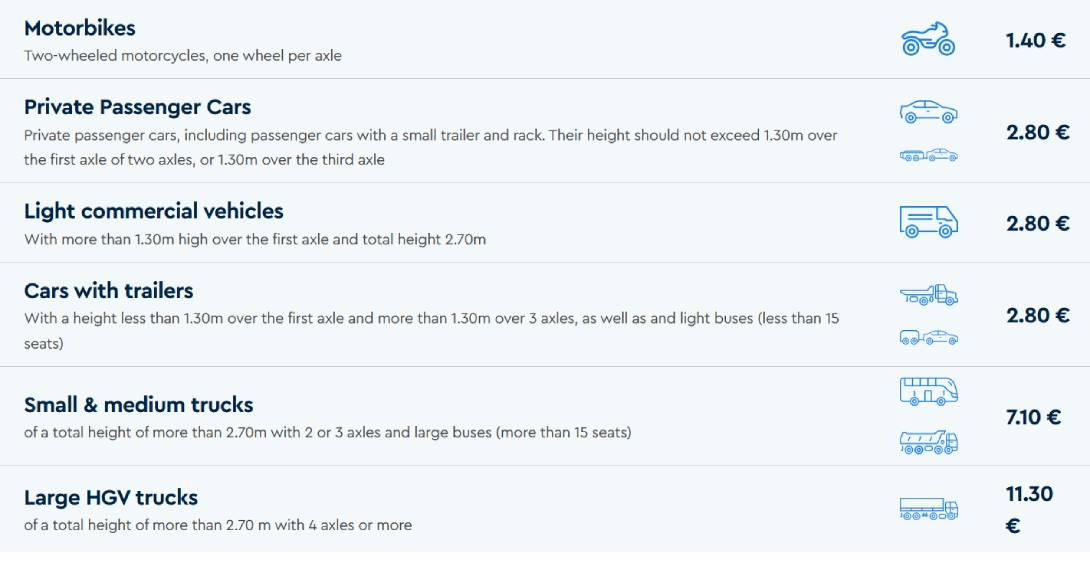
Tolls in Greece: 6 things to know before your trip
Renting a car in Greece is a great way to make the most of your trip, offering breathtaking views and easy access to historic sites. However, understanding the toll system is essential to saving time and money. For travelers exploring the country's scenic highways, the tolls can sometimes come as a surprise, leading to unexpected costs and confusion. Many visitors to Greece are unfamiliar with the local toll systems, which vary by region and may involve different payment methods. This lack of knowledge can result in frustrating delays or higher-than-expected expenses. With Motor Plan, renting a car gives you the flexibility to navigate Greece’s toll roads with ease, ensuring a smooth and enjoyable journey.
This guide provides 6 essential tips and how-to's to ensure your trip through Greece is stress-free, with no worries about tolls.
- How tolls work
- Payments options
- How to calculate the cost
- How to save money
- How to avoid Common mistakes
- Rules and Safety Tips
Navigating Greece's Toll Roads: Payment Methods and Key Highways

In Greece, toll roads are an essential part of the infrastructure, ensuring smooth travel across the country. To use these motorways, drivers are required to pay tolls, which can be done either via cash, credit card or a Greece toll pass. The Egnatia Pass is a popular option for those traveling along the Egnatia Odos, a major highway stretching from the west to the east of the country. Other prominent toll roads include the Attiki Odos, the ring road around Athens. These tolls contribute to road maintenance and upgrades, providing a faster and safer driving experience for all travelers.
Best Toll Payment Options in Greece
When traveling through toll roads in Greece, various payment options are available to ensure a smooth and convenient journey. These methods cater to both traditional and modern preferences, offering flexibility depending on the route and technology available.
- Manual Payment at Booths: This classic method allows drivers to pay tolls with cash or credit cards directly at toll booths. While it's a reliable choice, it can sometimes lead to delays, especially during peak hours.
- Electronic Transponders (e.g., e-Pass): With an e-Pass device, drivers can seamlessly pass through tolls without stopping, automatically deducting the toll from their account. This method is widely used on major routes like the Greece toll pass system and Egnatia Pass, offering a faster, more efficient alternative.
Electronic payment methods—whether e-Pass or other transponder systems—are becoming the preferred option for their convenience, speed, and reliability.
A Quick Guide to Calculating Toll Costs in Greece.
When traveling through Greece, understanding toll costs is essential for budgeting your journey. Greece's toll system varies based on several factors, such as the type of vehicle, the distance traveled, and the specific motorway. Here's a breakdown of approximate toll costs for different vehicles:
- Cars: Typically between €2 and €5 per toll station.
- Motorcycles: Usually range from €1.50 to €3.
- Trucks: Can cost between €5 and €15, with larger vehicles paying higher rates.
Factors that influence toll pricing include:
- Distance traveled: Longer routes result in higher toll charges.
- Traffic volume: High-traffic routes may have higher toll rates due to congestion and demand.
- Technology used: The type of toll collection system (e.g., manual vs. electronic) can impact operational costs and toll rates.
- Specific motorway: Some highways, like the E65 or E92, have varying toll rates.
Four of the Main Toll Roads in Greece
Four major toll roads in Greece form the backbone of the country's road network, linking key cities and regions. These highways play a crucial role in connecting both locals and tourists to important destinations across the nation.
Athens-Thessaloniki National Road (E65): This is the most central and busiest highway in the country, connecting the capital, Athens, with the second-largest city in Greece, Thessaloniki. It passes through several major cities and includes numerous toll stations.
Indicatively, the toll costs from:
- Athens to Lamia: approximately 13.80€
- Athens to Larissa: approximately 23.90€
- Athens to Thessaloniki: approximately 33.55€
Egnatia Road (E90): This is the largest road axis in Northern Greece, connecting Igoumenitsa with Kavala and other cities in Northern Greece. It passes through areas with significant economic and tourist interest.

Indicatively, the toll costs from:
- Igoumenitsa to Thessaloniki: approximately 8.80€
- Thessaloniki to Kavala: approximately 5.70€
Olympia Odos (E65): This is an important motorway connecting Athens with the Peloponnese, passing through cities such as Corinth and Patras, and providing access to areas of archaeological and tourist interest, such as Ancient Olympia.

Indicatively, the toll costs from:
- Athens to Corinth: approximately 4.40€
- Athens to Patras: approximately 13.30€
Attiki Odos: This is a peripheral highway that covers a large part of Attica and connects the center of Athens with the northern and eastern suburbs, as well as the Eleftherios Venizelos Airport.

Indicatively, the toll cost from:
- The center of Athens to Eleftherios Venizelos Airport: approximately 4.20€
Tips to Save Money on Tolls
-
Purchase a Prepaid Transponder: For frequent travelers, investing in a prepaid transponder can help save money by offering discounted toll rates and eliminating the need for cash payments at toll booths.
-
Avoid Peak Travel Times: Travel during off-peak hours to avoid high traffic congestion. Not only will this save you time, but it can also reduce fuel consumption, resulting in further cost savings.
-
Use Toll-Free Alternative Routes: Whenever possible, opt for scenic routes or highways that don't have tolls. These alternatives can help you avoid unnecessary costs while still reaching your destination. You can also avoid tolls by planning your route ahead of time and identifying free roads.
For example, a family was traveling from Thessaloniki to the port of Piraeus to catch a ferry to Crete. While driving along the E90, they discovered toll-free routes that led them through charming villages with traditional Greek architecture and stunning coastal views of the Aegean Sea. By choosing these alternative, toll-free routes, they were able to:
-
Save money by avoiding toll fees.
-
Enjoy a beautiful detour and experience the scenic beauty of Greece.
These simple strategies can help you cut down on toll-related expenses while enjoying a more efficient travel experience.
Common Toll-Related Mistakes to Avoid While Driving in Greece
Traveling through Greece by car can be a beautiful experience, but it’s important to be aware of common toll-related mistakes to avoid unnecessary hassles and fines. Here are some key points to keep in mind when navigating toll roads:
- Not having cash or a compatible card at manual toll booths: Many toll booths in Greece still require cash or specific cards for payment. Make sure to carry enough cash or a compatible card for smooth passage.
- Misunderstanding signage: Greek toll roads often have complex signage, and not paying attention could lead you to accidentally take a toll road. Always double-check your route and signage to avoid unexpected fees.
- Ignoring local regulations for toll payment: Each toll road may have its own rules regarding payment methods and time limits. Failing to follow these local regulations could lead to hefty fines.
Tip: You can always ask at the car rental office for advice. The staff are locals and can offer helpful tips about the tolls that will make your journey smoother.
Important Rules and Safety Tips for Driving on Highways of Greece
Driving on Greece’s highways requires familiarity with local traffic laws to ensure safety and avoid penalties. Here are key rules and tips for travelers:
- Speed Limits: The maximum speed limit on highways is typically 120 km/h, but always look for signs indicating lower limits in certain zones.
- Right of Way: In Greece, vehicles entering a roundabout must yield to those already inside. Be aware of priority road signs at intersections to avoid confusion.
- Toll Roads: Greece has several toll roads. Always pay attention to toll booth instructions and keep your receipts, as non-payment can lead to fines.
- Emergency Services: In case of an emergency, dial 112 for urgent assistance. Roadside help is available, but always ensure your vehicle is in a safe spot while waiting for help.
For more detailed information, be sure to read “Driving rules and their peculiarities in Greece” to fully prepare for your journey.
Make the Most of Your Greek Road Trip with Expert Tips and Preparation
In conclusion, driving in Greece offers an incredible opportunity to explore its stunning landscapes and historical landmarks. However, understanding the toll system and traffic regulations is crucial for a smooth and cost-effective journey. With varying toll rates, multiple payment methods, and essential safety rules to follow, being prepared is the key to avoiding unexpected fees and delays.
Equip yourself with all the necessary rental tips and make your Greek road trip truly unforgettable by exploring our car rental options and travel guides. Start your journey today and experience Greece with ease!
